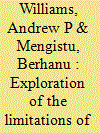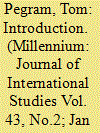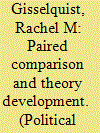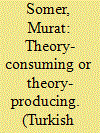|
|
|
Sort Order |
|
|
|
Items / Page
|
|
|
|
|
|
|
| Srl | Item |
| 1 |
ID:
137633


|
|
|
|
|
| Summary/Abstract |
This article seeks to unpack the implications of contemporary peacebuilding for technocratic, bureaucratic organizational forms. It argues that if the contemporary peacebuilding literature is taken as given, fundamental alterations are required in predominately Western peacebuilding systems—specifically in the structure and function of bureaucratic organizations that typically fund, manage and execute peacebuilding interventions. The analysis proceeds by matching five ‘peacebuilding principles’ derived from contemporary literature, with an organizational framework that highlights key structural and functional aspects of bureaucracies, thus allowing organizational deficiencies to be identified. The article argues that current peacebuilding scholarship would benefit from theoretically guided organizational research on the various organizations and systems involved in peacebuilding implementation. It concludes that peacebuilding scholars can be informed by the significant body of knowledge in the fields of public administration and policy, which bring a rich history of studying implementation situations that parallel in many ways complex peacebuilding interventions.
|
|
|
|
|
|
|
|
|
|
|
|
|
|
|
|
| 2 |
ID:
141205


|
|
|
|
|
| Summary/Abstract |
Global governance is in flux. Scholarship on the practice of global governance has reimagined it as a realm of disputes and confrontation, rather than one of interest-alignment within multilateral interstate forums. A profound sense of governance deficit is provoking critical reflection both within the corridors of power and among practitioners and scholars. A call within academic circles for renewed reflection on global governance as a practice-oriented scholarship has elicited varied responses from the international relation (IR) fraternity. In taking stock of the state of the art of ‘global governance theory’, a number of scholars have advocated for its revival to be grounded in the kind of critical reflection often absent from mainstream IR discussion. Others contest any meaningful demarcation between IR and global governance scholarship. This forum responds to a number of converging developments. Situating contributions broadly within the notion of an interregnum, it is a first cut towards a more innovative global governance research and practice-oriented agenda. We focus, in particular, on reframing the problematique of global governance from one dominated by multilateral interstate geopolitics, towards a critical reappraisal of both structure and political economy in light of the evident complexity of global governance systems.
|
|
|
|
|
|
|
|
|
|
|
|
|
|
|
|
| 3 |
ID:
131695


|
|
|
| 4 |
ID:
135841


|
|
|
|
|
| Summary/Abstract |
Case studies of Turkey are typically read and cited as narratives of the Turkish case itself, suppliers of case-specific data, or at best, applications of more general theories. They are not perceived as theory-testing, producing, or even informing exercises. While this tendency partly results from the institutional, geographical–cultural, and methodological biases of extant social sciences, scholars may also be to blame for neglecting theory-development or for producing descriptive narratives. How can Turkish Studies scholars successfully contribute to general theory-development in their respective disciplines? The main value of Turkey for producing theory may lie in its rare combination of many qualities and in its temporal and regional variations. Thus, this article argues that, besides small-N and large-N comparative studies, the most promising way Turkish Studies can engage in theory-building may be by examining Turkey as a theory-developing critical case, i.e. as a crucial or, pathway or within-unit comparative case. For this, scholars would carefully design their studies as theory-infirming, theory-confirming, or theory-producing crucial case studies, utilize temporal and cross-sectional comparisons, and pay special attention to causal mechanisms, sequences, and processes. By using evidence from publications that draw on the Turkish case, the article shows that, since the 1990s, scholars have produced more research published in highly ranked journals of comparative politics, international relations and area studies. They also generate more single case studies with general theoretical ambitions and more visibility but so far with unclear actual theoretical impact. The article discusses some qualities of Turkey which make it a promising critical case for theory-development and how studying it this way can also help to achieve a better understanding of Turkey itself.
|
|
|
|
|
|
|
|
|
|
|
|
|
|
|
|
|
|
|
|
|